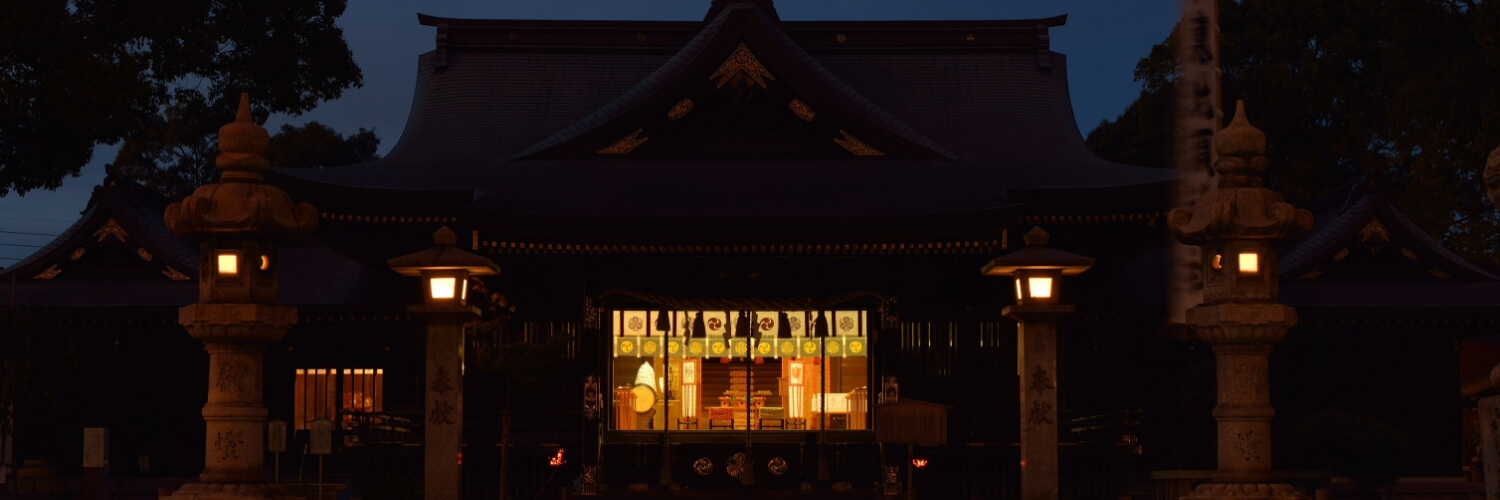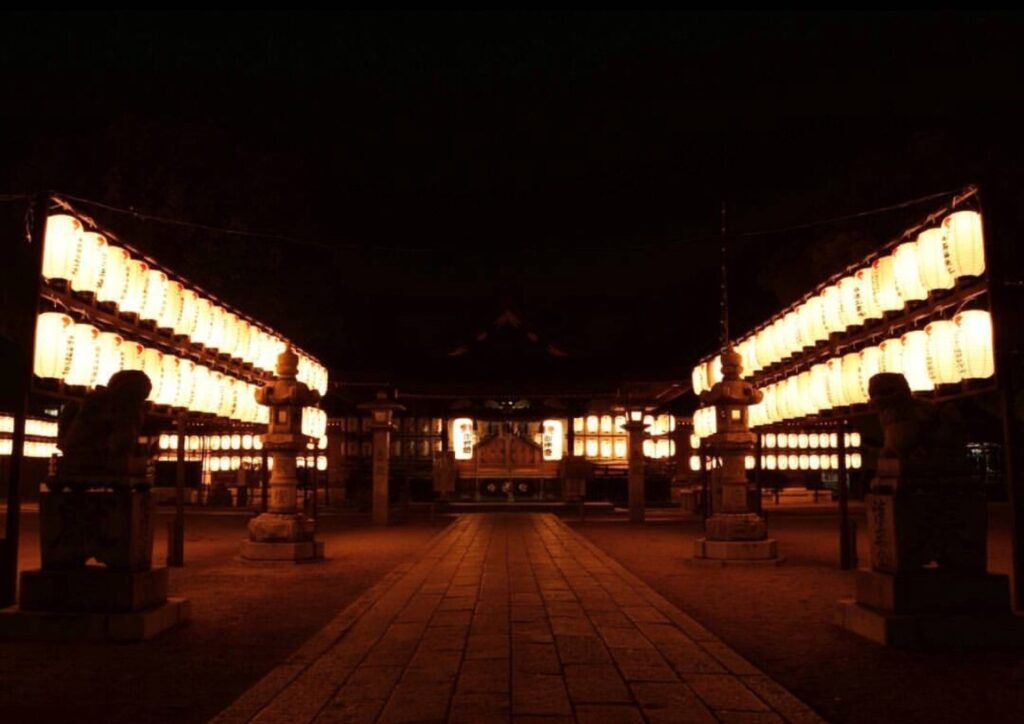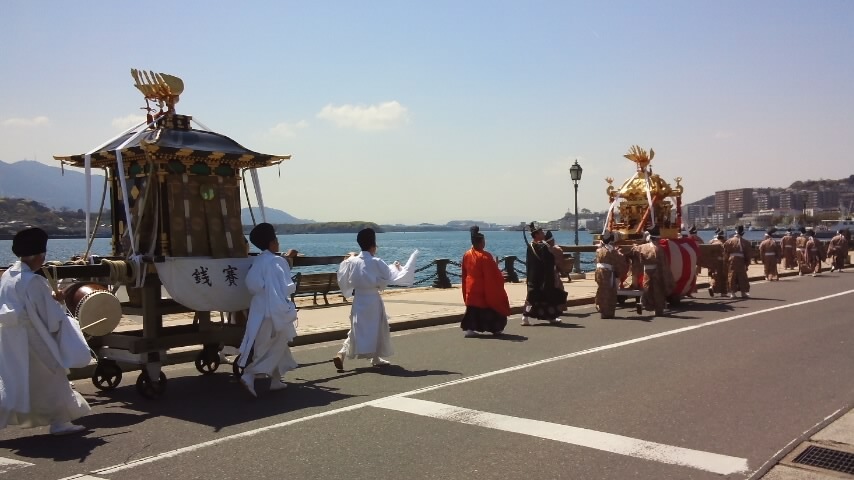| 1月1日 | 歳旦祭 / Saitan-sai ( Prayers for good fortune throughouout the Year ) |
|---|
| 1月9日~11日 | 十日ゑびす祭 / Toka-Ebisu-sai
十日ゑびす祭では「商売繁昌で笹持って来い。」という掛け声とともに福笹つきの縁起物の福引きを賑々しくくりひろげます。福引きでは福かき(熊手)や、宝船などが当たります。この十日ゑびすは、お正月気分から抜け出し、「さあ今年も一生懸命働きますからえびす様どうか守って下さい」という誓いと願いが込められたお祭です。例年変わらず
1/9 9:00~21:00まで
1/10 6:00~21:00まで
1/11 9:00~17:00まで 開催しております。
Wakamatsu-Ebisu jinja holds Toka Ebisu Festival from January 9 through 11 for three days. It is opened a variety of lotteries ornamented with lucky charm twigs in great turnout, and heard powerful shouts, ”Shoubaihanjo de sasa motte koi”(meaning; it was a good year so we shall bring bamboo twigs).In lotteries, we can get lucky charm items such as Fukukaki(bamboo rake) or Takarabune(treasure ship) etc.People change their mood from new year’s holidays to customary workdays on this occasion, this Toka ebisu festival is concentrated with pledge and wish of folks, “Ebisusama, we newly start business for this year and please protect us, by your grace. ” |
|---|
| 1月15日 | 古神符焼納祭(どんど焼き) / Dondo-yaki(People gather New Year’s ornaments and burn them in a big bonfire.)
例年変わらず10:00より行います。近隣への影響を鑑み11時には火を消しますので必ず前日までにお持ちください。この祭事以降の正月注連飾りは一切受け付けません。(*)人形や財布等、個人様にとって大切なものでしょうが神社とは一切関係ないので持ち込みは全て不可能です。お持ち帰りください。また鏡餅の受け取りも不可です。 |
|---|
| 1月25日 | 初天神祭 / Hatsu-Tenjin-sai |
|---|
| 2月~12月まで | 月次祭(つきなみさい)斉行 / Tsukinami-sai( Monthly Ritual )
(*)2月から12月まで、各月1日午前9時より
First day of February through December, 9:00am |
|---|
| 2月3日 | 節分祭 / Setsubun-sai
(*)神事のみ執り行います。豆撒きは行いません
‘Setsubun’ is a festival held on February 3, one day before the start of spring according to the Japanese lunar calendar. |
|---|
| 2月初午の日 | 初午祭 / Hatsu’uma-sai (First Horse Day festival) (held at the Inari-sha subsidiary shrine) |
|---|
| 2月11日 | 紀元祭 / Kigen-sai ( Celebration for National Foundation Day ) |
|---|
| 4月2日~4日 | 春季大祭 / Shunki-Taisai ( Great Spring Festival )
「おえべっさん」春の大祭は、「商売繁昌と海上安全の守り神」として親しまれており、一年間の「福徳円満 恵宝長寿」を招く神事として、約四百年もの伝統があります。また、若松の中心地を練り歩く4/2催行の御神幸行事は、荒魂(アラミタマ)をお乗せした神輿と、和魂(ニギミタマ)をお乗せした鳳輦(ホウレン)が笛と太鼓の音色に合わせ、供奉、神職の行列が続きます。
例年変わらず
4/2 9:00~21:00まで
4/3 9:00~21:00まで
4/4 9:00~21:00まで 開催しております。
Spring huge-scaled festival known as `Oebessan` is held from April 2 through 4 for three consecutive days. Here Wakamatsu Ebisu jinja has been familiar with its enshrined guardian deity of `Sea guard and prosperous business`, this spring festival has approximately 400 years’ tradition as an advance religious ritual that is said to give rise of ‘Prosperity wealth and happiness, healthy long life’.Also there is a ceremony called `Gojinkousai`, in which Mikoshi(a portable shrine) that transports the deity of Aramitama(rough side of a sprit) and Horen (the imperial palanquin) that transports the one of Nigimitama(normal state of the Kami) parade through the city central, while music is played on Japanese flutes and drums. Next to them, accompanies and Sinto priests follow on the prade. |
|---|
| 7月31日 | 夏越祭 / Nagoshi-sai ( Great Purification )
19:00~21:00 |
|---|
| 11月15日 | 七五三祭 / Ceremony for 7, 5, and 3 year-old children |
|---|
| 12月2日~4日 | 例大祭 / Rei-taisai ( Annual Major Ritual /Great Autumn Festival )
「おえべっさん」として若松の人々に親しまれている秋の大祭。福神玉替(12/2のみ)は、鯛土鈴の替え玉を、花火を合図にいっせいに「かえましょ、かえましょ」と、声を掛け合い、周りの人と玉を替えあいます。再び花火が打ち上げられると抽籖が行われます。福寿祭御座は江戸時代初期に始まった特殊行事で、「鰤の手ぶり」といって、神前から撤下した鰤を宮司が丹念に調理作法いたします。
例年変わらず
12/2 9:00~21:00まで
12/3 9:00~21:00まで
12/4 9:00~21:00まで 開催しております。
The great autumn festival well known as ‘Oebessan’ is held from December 2 through 4 every year.“Fukujin Tamakae”(Ball-exchanging ritual) is started with the first fire works, people all together speak to each other “Kaemasho, Kaemasho”(Kaemasho means let’s exchange),andexchange each cute ceramic bell shaped of a red sea bream, on bream, on which lottery number is attached. With the firework again, they finally stop exchanging and keep the own bell then move on the next lottely event.“Fukujusai Oza” is an unique event originated in the early Edo era, it is performed cooking manners called ‘Buri-no-teburi’ by the chief priest. The priest carefully cooks the yellowtail taken from the offering at the deity. |
|---|
| 12月31日 | 除夜祭 / Joya-sai (New Year’s Eve festival and Year-end grand purification)
23:30~23:45 |
|---|





